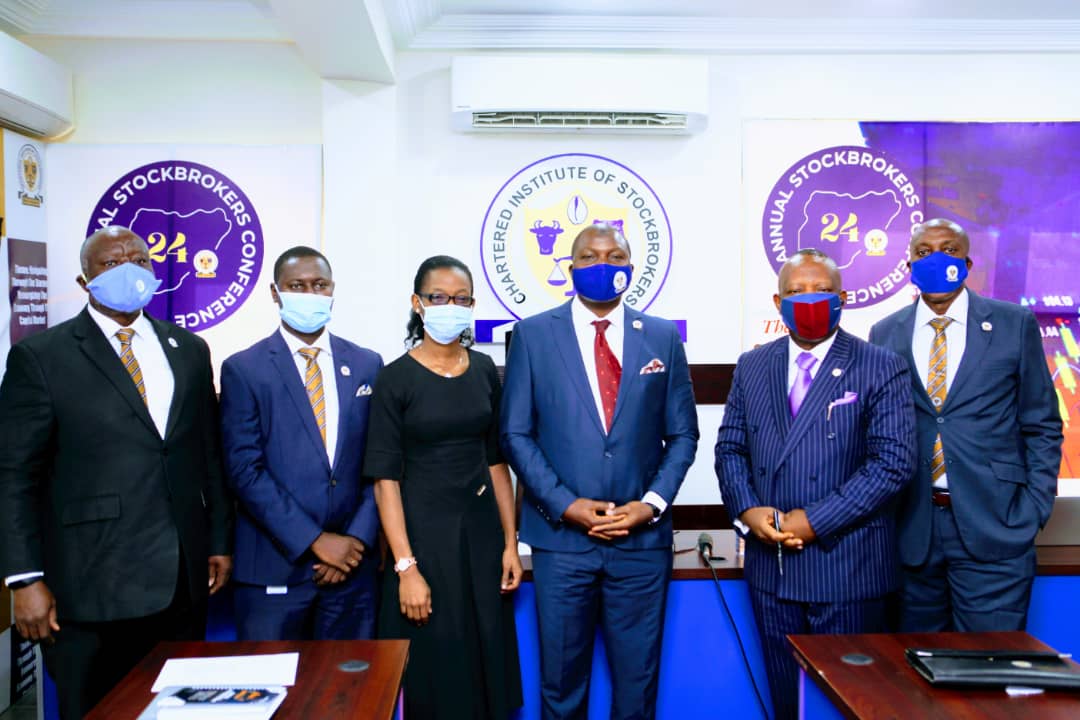Participants at this year’s edition of annual economic review of the Chartered Institute of Stockbrokers (CIS) have unanimously projected that outlook for the Nigerian economy remained positive for the capital market but identified certain factors that need to be addressed for optimal performance of both the economy and the market.
In the webinar entitled “The Nigerian Economic Review for 2020 and Outlook for 2021 With Recommendations”, the Institute identified the major factors that will propel Nigeria’s economic growth despite the negative impacts of COVID-19 on businesses globally.
Presenting the Institute’s position paper, the Chairman, Research and Technical Committee, Mr Akeem Oyewale explained that economic outlook for 2021 was predicated on the timing and availability of vaccines to put covid-19 under control.
“Private sector activity needs to be significantly stimulated, while the Micro Small and Medium Scale business class should have greater access to viable long term capital. These will be effectively accomplished if the equity capital market is supported, strengthened and stabilized with continuous liquidity. Based on the universally acknowledged principle that the money (short term) and capital (long term) markets complement each other in the economic development process, we wish to call on the Central Bank of Nigeria (CBN) to extend the following structural / liquidity support to the equity arm of the Nigerian capital market:
“Creation of an intervention fund for securities dealing firms, to avail them the necessary liquidity to maintain consistent position on quoted securities, thus stabilizing the market.
Permit banks’ stocks to qualify for investment of margin lending facilities, under strict regulatory controls, because of its significant impact on market turnover. In view of the gradual return of local investors, we enjoin the Central Bank of Nigeria to be temperate in dealing with interest rate, liquidity and yield adjustments in its monetary policy.
Historically, local pension funds served as the critical catalyst for stabilizing and propelling growth in the advanced economies of the world. We therefore urge the Pension Commission (PenCom) and Nigeria’s Pension Fund Administrators (PFAs) tosignificantly increase the percentage of pension funds invested in the Nigerian equity market. Investment of Nigerian pension funds in local equities remain less than 10% of pension funds under management, but we strongly believe that, given the current needs and safety structures of the Nmarket, the 25%statutory cap can be safely made a minimum figure for the PFAs.
“The impressive equity index performance aside, the massive 446 percent oversubscription of the FGN’s third Sukuk Bond, issued to construct and rehabilitate as many as 44 major roads across the country, has further confirmed the strong absorptive capacity of the Nigerian capital market..”, according to the paper.
In his contribution, a Professor of Capital Market Studies, Nasarawa State University and President, Association of Capital Market Academics of Nigeria, Prof. Uche Uwaleke said the government could finance the budget deficit of N5.2 Trillion through floating of Federal Government Bond, Securitization of debts and privatization of moribund companies.
Speaking on; “Capital Market Pathways To Financing The FGN Budget Deficits”, Uwaleke stated that government should “issue infrastructure/revenue bonds/project-tied bonds to ensure that the proceeds are ring-fenced as opposed to the current resort to general obligations bonds which proceeds often go into recurrent spending.”
An economic consultant, Dr Biodun Adedipe of B. Adedipe and Associates who spoke on “Global Economic Dynamics in 2021”, explained that success of COVID-19 vaccine in the United States and China would have positive impacts on Nigeria but strongly advocated for investment in Agriculture, ICT and manufacturing as they have potentials to revive the economy. Adedipe added that Government should make credit available, accessible and attractive for investment.
Another economic consultant, Mrs Kemi Akinde, urged the government to align fiscal and monetary policies and ensure consistency of both policies. She also advised The Nigerian Stock Exchange to commence trading in derivatives without further delay to enable investors enjoy the opportunities for risk management. Akinde stated that the Securities and Exchange Commission ( SEC) should fully automate its fillings for efficient service delivery.
Earlier in his welcome address, the Institute’s The President/Chairman of the Council, Mr. OlatundeAmolegbe, said the Council had approved a recommendation of the Research & Technical Committee, that the Institute carry out a thorough review of the Nigerian economy every year with a view to helping government, policymakers and industry regulators in the country craft effective strategies to accelerate GDP growth in the country.






